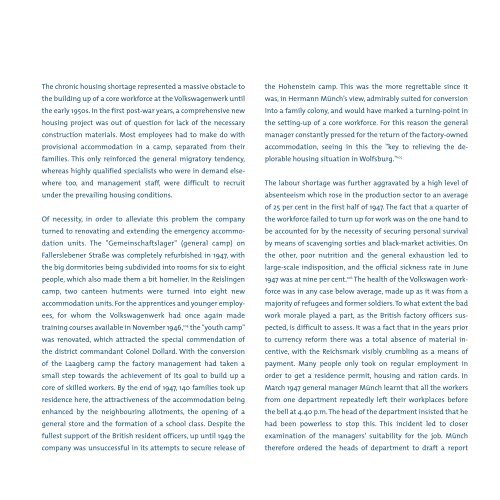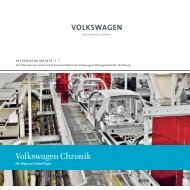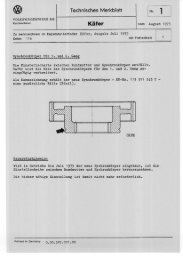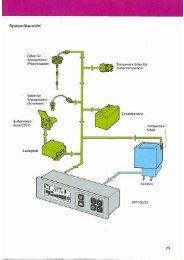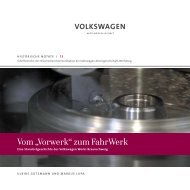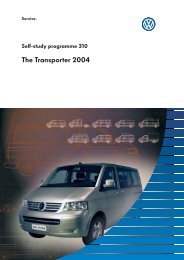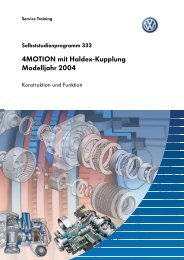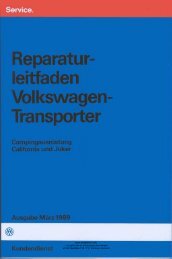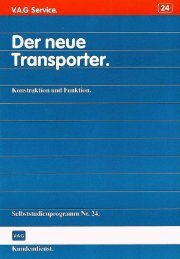HN 2: The British and their Works
HN 2: The British and their Works
HN 2: The British and their Works
You also want an ePaper? Increase the reach of your titles
YUMPU automatically turns print PDFs into web optimized ePapers that Google loves.
<strong>The</strong> chronic housing shortage represented a massive obstacle to<br />
the building up of a core workforce at the Volkswagenwerk until<br />
the early 1950s. In the first post-war years, a comprehensive new<br />
housing project was out of question for lack of the necessary<br />
construction materials. Most employees had to make do with<br />
provisional accommodation in a camp, separated from <strong>their</strong><br />
families. This only reinforced the general migratory tendency,<br />
whereas highly qualified specialists who were in dem<strong>and</strong> elsewhere<br />
too, <strong>and</strong> management staff, were difficult to recruit<br />
under the prevailing housing conditions.<br />
Of necessity, in order to alleviate this problem the company<br />
turned to renovating <strong>and</strong> extending the emergency accommodation<br />
units. <strong>The</strong> "Gemeinschaftslager" (general camp) on<br />
Fallerslebener Straße was completely refurbished in 1947, with<br />
the big dormitories being subdivided into rooms for six to eight<br />
people, which also made them a bit homelier. In the Reislingen<br />
camp, two canteen hutments were turned into eight new<br />
accommodation units. For the apprentices <strong>and</strong> younger employees,<br />
for whom the Volkswagenwerk had once again made<br />
training courses available in November 1946, 104 the "youth camp"<br />
was renovated, which attracted the special commendation of<br />
the district comm<strong>and</strong>ant Colonel Dollard. With the conversion<br />
of the Laagberg camp the factory management had taken a<br />
small step towards the achievement of its goal to build up a<br />
core of skilled workers. By the end of 1947, 140 families took up<br />
residence here, the attractiveness of the accommodation being<br />
enhanced by the neighbouring allotments, the opening of a<br />
general store <strong>and</strong> the formation of a school class. Despite the<br />
fullest support of the <strong>British</strong> resident officers, up until 1949 the<br />
company was unsuccessful in its attempts to secure release of<br />
the Hohenstein camp. This was the more regrettable since it<br />
was, in Hermann Münch’s view, admirably suited for conversion<br />
into a family colony, <strong>and</strong> would have marked a turning-point in<br />
the setting-up of a core workforce. For this reason the general<br />
manager constantly pressed for the return of the factory-owned<br />
accommodation, seeing in this the "key to relieving the deplorable<br />
housing situation in Wolfsburg." 105<br />
<strong>The</strong> labour shortage was further aggravated by a high level of<br />
absenteeism which rose in the production sector to an average<br />
of 25 per cent in the first half of 1947. <strong>The</strong> fact that a quarter of<br />
the workforce failed to turn up for work was on the one h<strong>and</strong> to<br />
be accounted for by the necessity of securing personal survival<br />
by means of scavenging sorties <strong>and</strong> black-market activities. On<br />
the other, poor nutrition <strong>and</strong> the general exhaustion led to<br />
large-scale indisposition, <strong>and</strong> the official sickness rate in June<br />
1947 was at nine per cent. 106 <strong>The</strong> health of the Volkswagen workforce<br />
was in any case below average, made up as it was from a<br />
majority of refugees <strong>and</strong> former soldiers. To what extent the bad<br />
work morale played a part, as the <strong>British</strong> factory officers suspected,<br />
is difficult to assess. It was a fact that in the years prior<br />
to currency reform there was a total absence of material incentive,<br />
with the Reichsmark visibly crumbling as a means of<br />
payment. Many people only took on regular employment in<br />
order to get a residence permit, housing <strong>and</strong> ration cards. In<br />
March 1947 general manager Münch learnt that all the workers<br />
from one department repeatedly left <strong>their</strong> workplaces before<br />
the bell at 4.40 p.m. <strong>The</strong> head of the department insisted that he<br />
had been powerless to stop this. This incident led to closer<br />
examination of the managers’ suitability for the job. Münch<br />
therefore ordered the heads of department to draft a report


